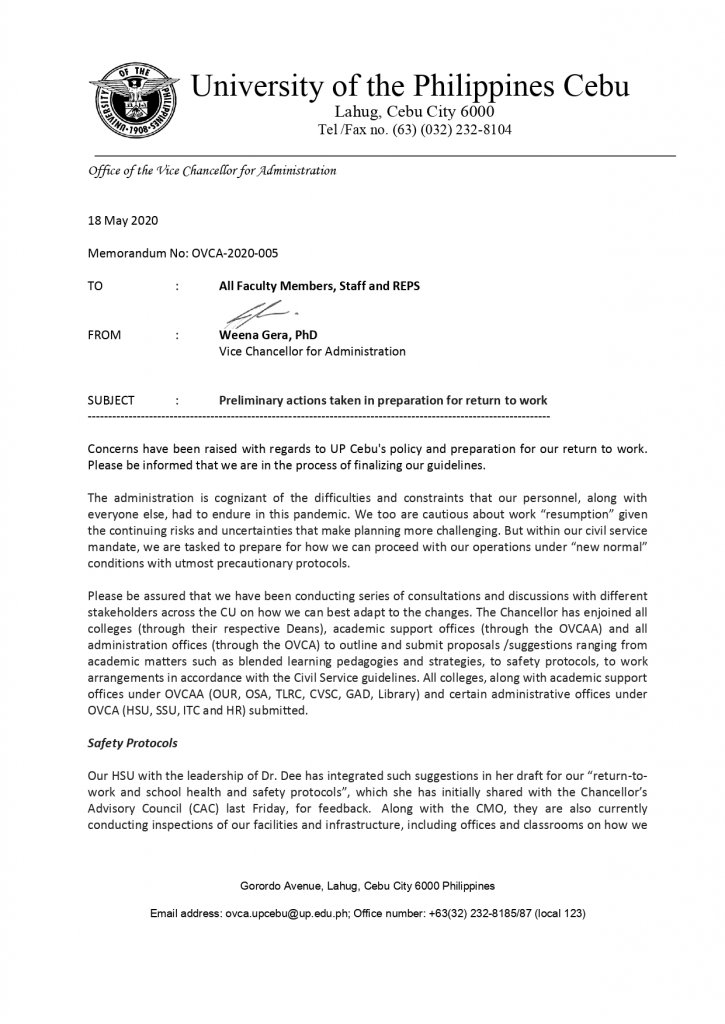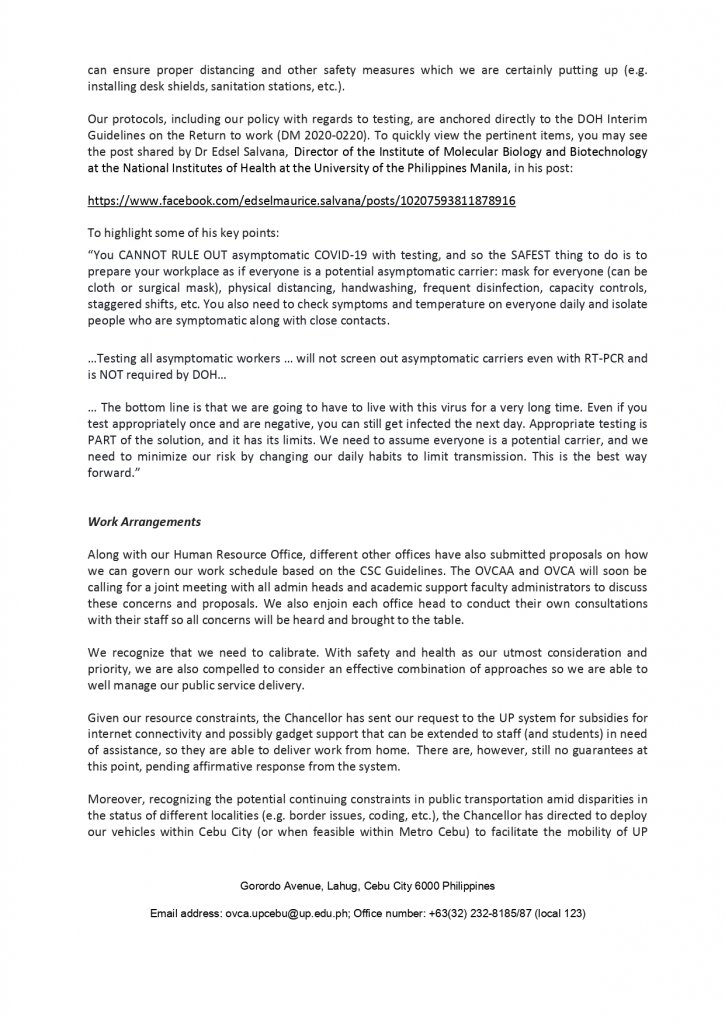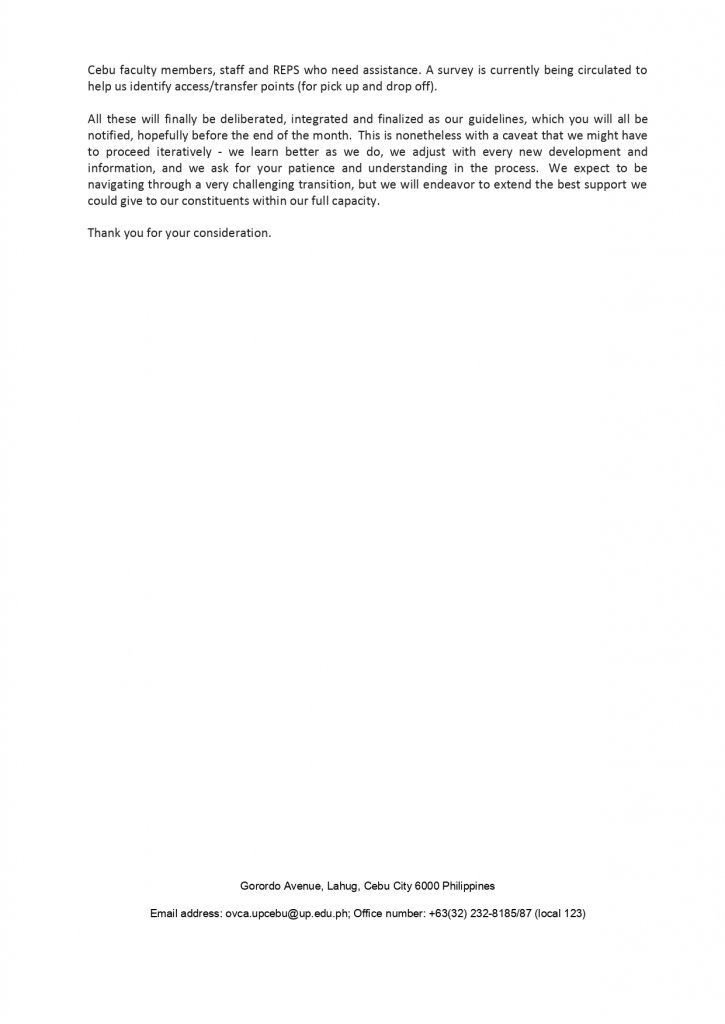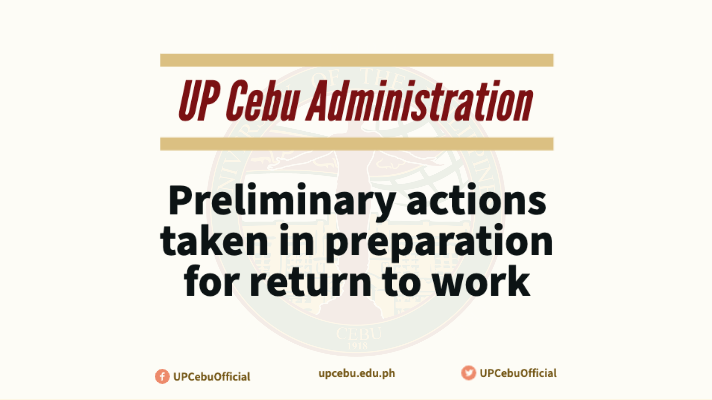Concerns have been raised with regard to UP Cebu’s policy and preparation for our return to work. Please be informed that we are in the process of finalizing our guidelines.
The administration is cognizant of the difficulties and constraints that our personnel, along with everyone else, had to endure in this pandemic. We too are cautious about work “resumption” given the continuing risks and uncertainties that make planning more challenging. But within our civil service mandate, we are tasked to prepare for how we can proceed with our operations under “new normal” conditions with utmost precautionary protocols.
Please be assured that we have been conducting a series of consultations and discussions with different stakeholders across the CU on how we can best adapt to the changes. The Chancellor has enjoined all colleges (through their respective Deans), academic support offices (through the OVCAA) and all administration offices (through the OVCA) to outline and submit proposals /suggestions ranging from academic matters such as blended learning pedagogies and strategies, to safety protocols, to work arrangements in accordance with the Civil Service guidelines. All colleges, along with academic support offices under OVCAA (OUR, OSA, TLRC, CVSC, GAD, Library) and certain administrative offices under OVCA (HSU, SSU, ITC, and HR) submitted.
Safety Protocols
Our HSU with the leadership of Dr. Dee has integrated such suggestions in her draft for our “return-to-work and school health and safety protocols”, which she has initially shared with the Chancellor’s Advisory Council (CAC) last Friday, for feedback. Along with the CMO, they are also currently conducting inspections of our facilities and infrastructure, including offices and classrooms on how we can ensure proper distancing and other safety measures which we are certainly putting up (e.g. installing desk shields, sanitation stations, etc.).
Our protocols, including our policy with regards to testing, are anchored directly to the DOH Interim Guidelines on the Return to work (DM 2020-0220). To quickly view the pertinent items, you may see the post shared by Dr. Edsel Salvana, Director of the Institute of Molecular Biology and Biotechnology at the National Institutes of Health at the University of the Philippines Manila, in his post:
Dr. Edsel Salvana’s Facebook post
To highlight some of his key points:
“You CANNOT RULE OUT asymptomatic COVID-19 with testing, and so the SAFEST thing to do is to prepare your workplace as if everyone is a potential asymptomatic carrier: mask for everyone (can be cloth or surgical mask), physical distancing, handwashing, frequent disinfection, capacity controls, staggered shifts, etc. You also need to check symptoms and temperature on everyone daily and isolate people who are symptomatic along with close contacts.
…Testing all asymptomatic workers … will not screen out asymptomatic carriers even with RT-PCR and is NOT required by DOH…
… The bottom line is that we are going to have to live with this virus for a very long time. Even if you test appropriately once and are negative, you can still get infected the next day. Appropriate testing is PART of the solution, and it has its limits. We need to assume everyone is a potential carrier, and we need to minimize our risk by changing our daily habits to limit transmission. This is the best way forward.”
Work Arrangements
Along with our Human Resource Office, different other offices have also submitted proposals on how we can govern our work schedule based on the CSC Guidelines. The OVCAA and OVCA will soon be calling for a joint meeting with all admin heads and academic support faculty administrators to discuss these concerns and proposals. We also enjoin each office head to conduct their own consultations with their staff so all concerns will be heard and brought to the table.
We recognize that we need to calibrate. With safety and health as our utmost consideration and priority, we are also compelled to consider an effective combination of approaches so we are able to well manage our public service delivery.
Given our resource constraints, the Chancellor has sent our request to the UP system for subsidies for internet connectivity and possibly gadget support that can be extended to staff (and students) in need of assistance, so they are able to deliver work from home. There are, however, still no guarantees at this point, pending an affirmative response from the system.
Moreover, recognizing the potential continuing constraints in public transportation amid disparities in the status of different localities (e.g. border issues, coding, etc.), the Chancellor has directed to deploy our vehicles within Cebu City (or when feasible within Metro Cebu) to facilitate the mobility of UP Cebu faculty members, staff and REPS who need assistance. A survey is currently being circulated to help us identify access/transfer points (for pick up and drop off).
All these will finally be deliberated, integrated, and finalized as of our guidelines, which you will all be notified, hopefully before the end of the month. This is nonetheless with a caveat that we might have to proceed iteratively – we learn better as we do, we adjust with every new development and information, and we ask for your patience and understanding in the process. We expect to be navigating through a very challenging transition, but we will endeavor to extend the best support we could give to our constituents within our full capacity.
Thank you for your consideration.
UP Cebu Administration
Download OVCA Memo No. 05




